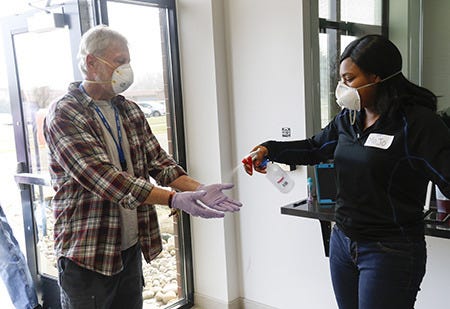Democracy is great and all, but if I owned a bus and saw a bunch of people waiting to be taken to the polling station that didn’t appear to share my political views, I wouldn’t offer them a ride.
This seems to be about the same position many Republicans, including the president, have on mail-in voting; they believe it will lead to more votes from people that typically align with the other side, so they oppose it. At least for now.
Risky voting in Wisconsin.
Due to the coronavirus, there was a surge in absentee ballot requests leading up to election day in Wisconsin last Tuesday—so many that the state’s election apparatus failed to get them mailed out in time so they could be returned and postmarked by the deadline. After inaction by the Republican legislature, the Democratic governor issued an executive order to postpone the election.
A federal district judge ruled against the governor’s order to delay the election, but decided to extend the deadline (by a few days) for mail-in ballots to be received. The idea was to allow a bit more time for citizens to mail out their ballots, as well as more time for them to be processed.
Republicans fought the ruling and ultimately won with the help of the five Republican-appointed Supreme Court justices. As a result, many Wisconsinites had to choose between not voting (it would have to be in person) or risking their health and that of their fellow citizens.

As you might guess, like the Republicans did, many cheeseheads decided not to vote. In Milwaukee, a democratic stronghold, it currently looks like less than 50% of the people voted compared with recent elections. This isn’t surprising considering there were only five polling stations opened in the city. Normally, there are 180. Poll-workers, many at risk due to their age, abandoned their shifts across the state.
Looking ahead.
After seeing the pictures from Wisconsin, people are concerned about what could happen in November. We all hope Covid-19 is in the rearview mirror by then, but it may not be.
One solution is to prepare for mail-in voting across America in far greater numbers than usual. Five states already have universal mail-in voting. That means everyone is mailed a ballot without asking (you can still vote in person if you want). In 28 other states—including Wisconsin—absentee ballots are available to all voters upon request. In the remaining 17 states, voters must provide an excuse such as having a disability or temporarily living out of state in order to vote by absentee ballot.
Opposition from the Oval.
Here’s a few of Trump’s thoughts via Twitter:


For the record: Trump recently voted by absentee ballot in last month’s Florida primary.
While it’s true that it’s easier for fraud to occur with mail-in voting, like all election fraud, it’s very rare. States with universal mail-in voting have very few problems. Besides, fraud big enough to sway an election is likely to be detected.
For whatever reason, Trump just likes to mislead when it comes to elections. In 2018, he had to shut down a White House commission he charged with investigating voter fraud after no real evidence of corruption turned up. Here he is calling the 2016 presidential election, that he later won, a “rigged election”:
The reality behind much of the Republican opposition to policies that make voting easier, such as mail-in voting, has more to do with the part about how it “doesn’t work out well for Republicans.” Recently on Fox & Friends, Trump, referring to voting reforms pushed by Democrats, said, “They had things, levels of voting that if you’d ever agreed to it, you’d never have a Republican elected in this country again.”
Many conservatives, especially in a state with an older population like Florida, vote via absentee ballot, but, as he tweeted, he thinks absentee ballots are great for them. He, like many Republicans, just doesn’t think it’s a good idea for Americans at large.
There is good reason.
Since 1988, the Republican candidate for president has won the popular vote exactly once, in 2004. Yes, it’s winning 270 electoral votes that matters, but it’s rare to do so while losing the popular vote. (It’s happened only five times in 58 presidential elections, but twice in the lifetime of any adult.)
The bottom line: Republicans know that disrupting the status quo by making it easier for people to vote—especially those that are more likely to align with Democrats like young people and working class folks—would likely be a bad idea, making it harder for them to win presidential elections than it already is, not to mention other close elections.
Republicans—that control most state legislatures where election rules usually get made—aren’t going to take anybody’s right to vote way in November, but unless their political calculation changes, they won’t be offering rides they don’t have to.
To Whom It May Concern


Mood:

Loose Screws
Thanks for reading. Sign up to get this newsletter in your inbox. Feel free to forward.





